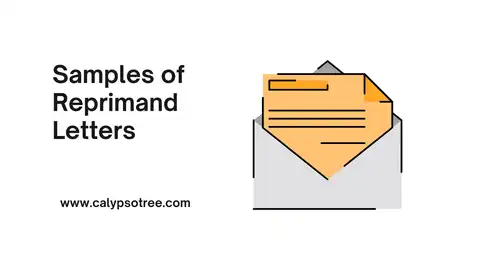Sample letter describing your child – Describing your child in a letter can be a deeply personal and joyful experience. This letter can be for a teacher, a special school, your family, or even for your kids to read when they grow up.
It is a way to share your heart and your child’s cool stories with others. It’s like wrapping up a box of all the good things about your kid and giving it to someone else to open and enjoy.
Here’s how you can write It, sharing all the cool and special things about them.
What is a letter describing your child?
A letter describing your child is a special letter where you talk about your child’s likes, what they are good at, and fun things about them. You write this letter to share with others the cool things about your child.
Purpose of the Letter: You might write this letter to:
- Tell a new teacher about your child.
- Help your child join a special club or program.
- Share with family and friends how your child is doing.
What should be included in the letter?
Before diving into writing the letter, it’s crucial to jot down the key points you wish to highlight about your child. These may include their:
Character Overview:
[Kid’s Name] is kind and caring. He/She makes friends easily and likes to help others. He/She is also very curious about the world.Achievements:
[Kid’s Name] does really well in school, especially in [subjects]. He/She also loves [activities] and has learned a lot from them, like [skills].Aspirations:
[Kid’s Name] wants to [what they want to do or be]. He/She is very excited about [something they like], and we know he/she will do great things.Unique Qualities:
One cool thing about [Kid’s Name] is his/her ability to [special talent].
We hope [Kid’s Name] can have chances to shine and grow. We think [how the recipient can help] could be a great step for him/her.
Thank you for reading about [Kid’s Name].
Warm wishes,
[Your Name and Contact Info]Why do you need to write a letter describing your child?
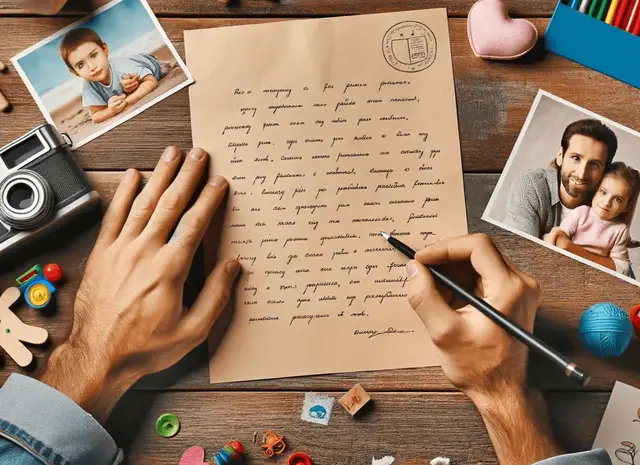
Writing a letter to talk about your child can be helpful for many reasons. Here are some:
- Meeting New Teachers: It letter can help the teacher understand more regarding your kid, like what they are right at and what they want.
- Joining Special Programs: To join a special club or program, you need to write a letter about what makes your child special.
- Asking for Help: If your child needs extra help in school because of health or learning problems, a letter can explain what kind of help they need.
- Sharing Good News: You can write a letter to tell family and friends about the good things your child has done.
- Keeping Memories: A letter can be a nice way to remember what your child is like at this age.
- Talking to Family: If some family members live far away or don’t live with you, a letter can help them know more about your child.
- Talking to Helpers: If your child talks to a counselor or a helper, a letter can help them understand your child better.
Who Should Receive Your Letter?
Writing a letter about your kid is like drawing a picture with words about how special they are. Here is should get to read this letter:
Teachers: Teachers help your kid learn new things every day.
Family: Your family will love to hear about what your kid is doing.
Friends: Good friends are like extra family members.
Special Program Leaders: If your kid wants to join a special club or program, a letter can help the leaders know why your kid is a great fit.
Counselors or Helpers: If your kid talks to a counselor or a helper, a letter can share important things about your kid to help them understand better.
Other Important People: Some other people might like a letter too, like your kid’s coach, tutor, or the parents of their friends.
Sample letter describing your child
Dear [Recipient’s Name],
I am writing to introduce my beloved son/daughter, [Child’s Name], who is a unique individual with a heart full of dreams and a mind ripe with curiosity.
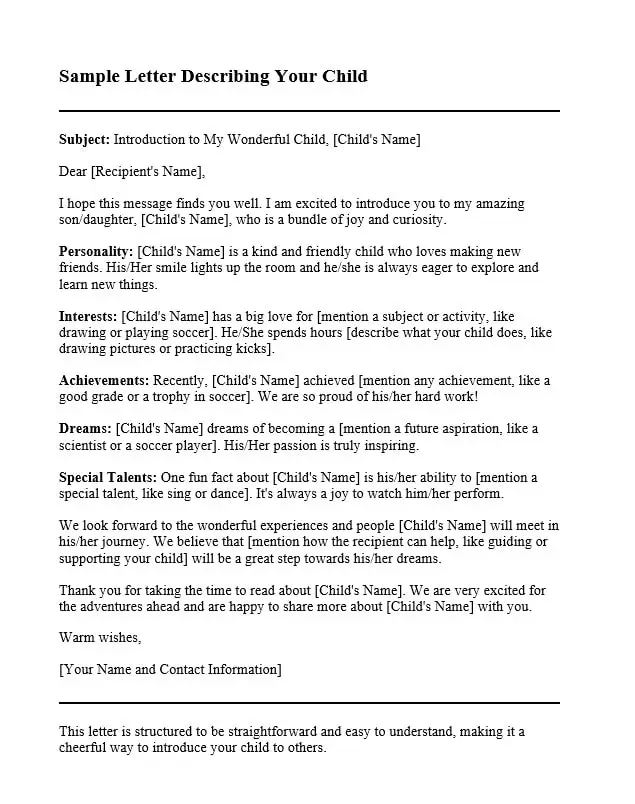
Sample Letter Describing Your Child In A Paragraph
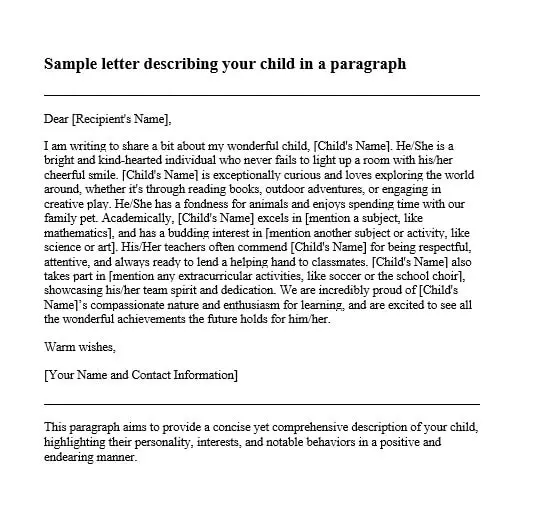
Sample Letter Describing Your Child In School
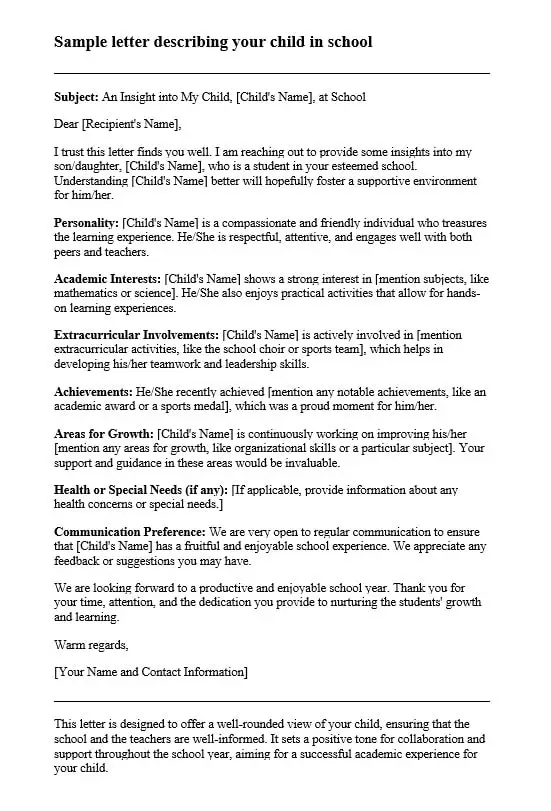
Sample Letter Describing Your Child to A Teacher
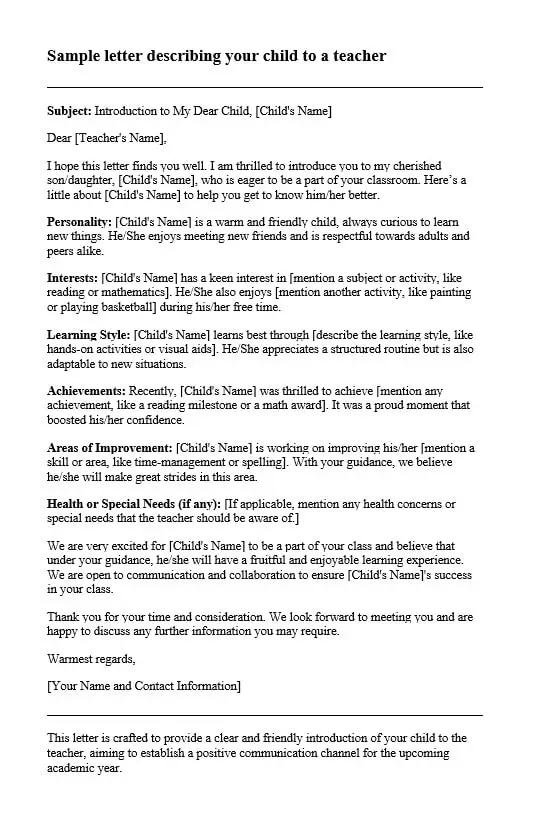
Common Mistakes and How to Avoid
Creating a letter to describe your child is a loving task, but it can have some tricky parts. Here are common mistakes people might make and tips on how to avoid them:
Making it Too Long:
- Mistake: Writing a very long letter that has too many details.
- How to Avoid: Keep your letter short and sweet. Pick the most important and fun things to talk about.
Forgetting the Purpose:
- Mistake: Not knowing why you are writing the letter.
- How to Avoid: Think about why you are writing the letter. Is it for a teacher, a special program, or a family? It can help you know what to say.
Not Being Clear:
- Mistake: Writing things that are hard to understand.
- How to Avoid: Use simple words and short sentences. Make your letter easy to read.
Only Talking About Achievements:
- Mistake: Only talking about awards or big wins.
- How to Avoid: It’s good to talk about achievements but also share what your child likes to do for fun and what makes them special.
Not Checking for Mistakes:
- Mistake: Sending the letter with spelling or grammar mistakes.
- How to Avoid: Read your letter again before you send it. Or ask someone else to check it for you.
Forgetting to Include Contact Information:
- Mistake: Not putting your name and how to reach you.
- How to Avoid: Always put your name and phone number or email at the end of the letter so people can get in touch.
Being Negative:
- Mistake: Talking about problems sadly or negatively.
- How to Avoid: It’s okay to share if your child needs help with something, but keep a hopeful and happy tone.
Words to Describe Your Child
When writing a letter about your child, choosing the right words can help paint a clear and loving picture of who they are. Here are some words you might use to describe your child:
Personality Traits:
- Kind-hearted
- Curious
- Cheerful
- Respectful
- Friendly
- Imaginative
- Patient
- Eager to learn
Academic Qualities:
- Hardworking
- Intelligent
- Inquisitive
- Attentive
- Diligent
- Organized
Social Qualities:
- Cooperative
- Helpful
- Encouraging
- Supportive
- Good listener
- Team player
Creative Abilities:
- Artistic
- Musical
- Creative
- Innovative
- Expressive
Physical Attributes:
- Active
- Energetic
- Agile
- Coordinated
Emotional Qualities:
- Compassionate
- Empathetic
- Understanding
- Resilient
Leadership Qualities:
- Responsible
- Confident
- Motivated
- Inspiring
How Would You Describe Your Child?
Describing your kid is like talking about your favorite story. Each child is special with their tale to tell. Here’s how you can think about and describe your kid:
What They Love:
- Think about what makes your kid happy.
- Talk about their favorite things to do.
How They Act:
- Is your kid shy, or do they make friends easily?
- Are they calm or always moving around?
What They Are Good At:
- Does your kid draw pretty pictures, solve puzzles quickly, or sing songs beautifully?
- Talk about the things they do well.
Their Happy Moments:
- Remember the times your kid was really happy.
- Share these happy stories.
Their Dreams:
- What does your kid want to be when they grow up?
- Do they have special dreams or wishes?
How They Learn:
- Does your kid like looking at pictures, listening to stories, or touching things to learn?
- Talk about how they best learn new things.
Special Things About Them:
- Does your kid have a funny laugh or a sweet smile, or do they give the best hugs?
- Share what makes your kid special to you.
Conclusion
Writing a sample letter describing your child is a nice thing to do. It shows others how cool your kid is. This letter can help your kid at school or with joining fun clubs.
It also lets you think about all the fun and happy times with your kid. So, pick up a pen or use a computer, and tell others about your awesome kid!
FAQ
How long should the letter be?
The letter can be short. A page or less is just right. It’s more important to share true and clear information than to write a lot.
Should I only talk about the good things?
It’s best to focus on the positive things about your child. But if there’s something important that the person reading the letter should know, like a health issue, it’s okay to include that too.
Can I add pictures or drawings to the letter?
Yes, adding pictures or drawings can make your letter special and fun to read.
What if my child has challenges or areas they are working on?
It’s okay to mention these but keep a positive tone. Talk about how your child is working hard and getting better in these areas.
How should I end the letter?
End with a thank you and an invitation to meet or talk more about your child. Remember to include your name and how to contact you.

The content creator team at calipsotree.com is dedicated to making topics accessible to everyone, with over 9 years of experience in writing and breaking down complex concepts into easy-to-understand articles that answer readers’ financial questions.







